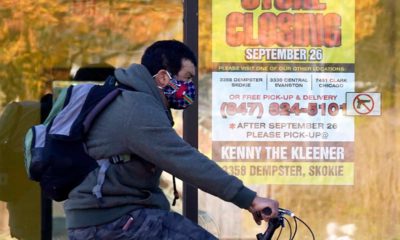Published
4 years agoon
By
AP News
LOS ANGELES — Mayors in several of California’s major cities steered away from calls to defund police budgets Wednesday and instead promised to work for reforms that would examine how police do their jobs in communities roiled by the death of George Floyd in Minneapolis.
Amid an emotional national reckoning of police tactics and race, protesters around the country have been calling to “defund” police departments, a word that has taken on a range of meanings from dismantling police forces to overhauling how dollars are spent in law enforcement, with more directed at health care, education and other community programs.
Sacramento Mayor Darrell Steinberg said a moment has arrived to fundamentally examine “what do we actually expect our police officers to do, and what do we want them not to do?”
Steinberg applauded Los Angeles Mayor Eric Garcetti’s recent announcement that the city would abruptly reverse plans for increased police spending and instead redirect $250 million from the city budget into programs for jobs and “healing” aimed largely at the black community.
“We have underinvested in the communities that most need us” when it comes to issues from public transportation to housing, Garcetti said at a later city briefing.
Steinberg lamented that a high volume of calls received by police have little or nothing to do with criminal violations, and noted that in cases involving mental illness, the arrival of an armed officer can increase the tension, rather than ease it.
“I think we can shift money. We must shift money. But I think that the money ought to follow the function,” he said, without providing details.
San Diego, the state’s second-largest city, voted to increase police funds this week. However, Mayor Kevin Faulconer said “it’s not going to be business as usual” and noted the earlier decision for police to immediately stop using so-called carotid restraints, also known as a sleeper hold, which involves using an arm to apply pressure to the sides of the neck in a move that can almost immediately block blood flow and render someone unconscious.
Activists say the hold is used disproportionately against people of color. Many departments already ban or restrict its use.


Bill McEwen: Five Steps to Heal America Under Biden


Here’s the Costume That May Have Infected 44 People and Killed One at San Jose Kaiser


Virus Spreading Quickly Within Households, Los Angeles Mayor Says


Virus Aid, Police Reform Dominate New US Laws for 2021


Los Angeles County Restaurants Defying Health Orders, Call Outdoor Dining ‘Peaceful Protest’ in Possible Loophole


Sheriff’s Deputies Break Up Huge Party in L.A. COVID Crackdown




